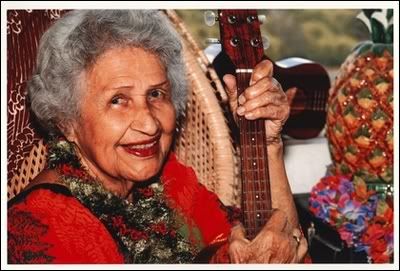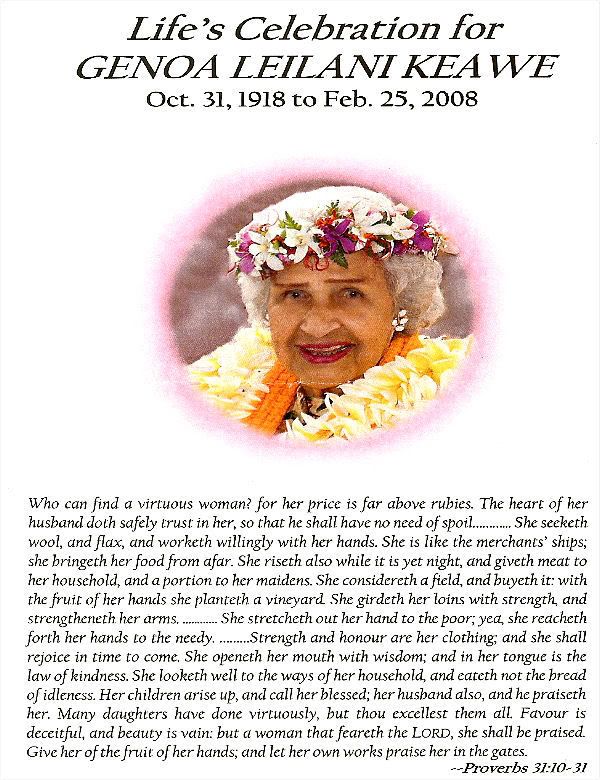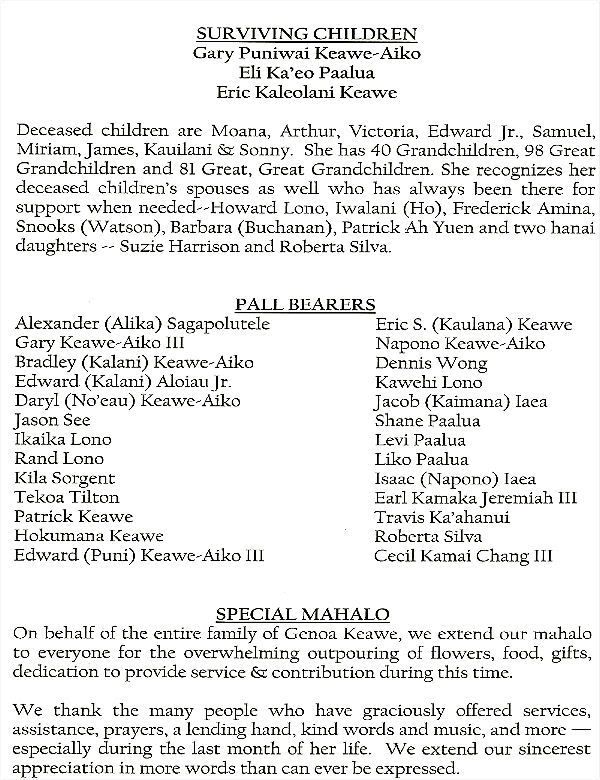


 TV show to pay tribute to the late Aunty GenoaBy Wayne HaradaAdvertiser Staff WriterA tribute to the late Genoa Keawe, the First Lady of Hawaiian Song, will be part of Emme Tomimbang's "Emme's Island Moments Island Icons" TV special, airing at 9 p.m. March 7 and 3 p.m. March 29 on KHON2.Tomimbang, producer-host of an ongoing series of shows on Island personalities, had planned a retrospective special on Keawe last year, to document her nearly 70 years in entertainment, not expecting Keawe's death last Feb. 25.The biography has evolved into an homage to the noted falsetto singer, who will reflect on her long and colorful career as well as her influence on a generation or two of other performers.Guests on the show will include Kealoha Kalama, Frank Kawaikapuolani Hewett, Amy Hanaiali'i Gilliom, Natalie Kamau'u, Aunty Malia Craver and O'Brien Eselu who will reflect on Aunty Genoa's legacy.
TV show to pay tribute to the late Aunty GenoaBy Wayne HaradaAdvertiser Staff WriterA tribute to the late Genoa Keawe, the First Lady of Hawaiian Song, will be part of Emme Tomimbang's "Emme's Island Moments Island Icons" TV special, airing at 9 p.m. March 7 and 3 p.m. March 29 on KHON2.Tomimbang, producer-host of an ongoing series of shows on Island personalities, had planned a retrospective special on Keawe last year, to document her nearly 70 years in entertainment, not expecting Keawe's death last Feb. 25.The biography has evolved into an homage to the noted falsetto singer, who will reflect on her long and colorful career as well as her influence on a generation or two of other performers.Guests on the show will include Kealoha Kalama, Frank Kawaikapuolani Hewett, Amy Hanaiali'i Gilliom, Natalie Kamau'u, Aunty Malia Craver and O'Brien Eselu who will reflect on Aunty Genoa's legacy.OCT. 31, 1918 ~ FEB. 25, 2008
Singer personified Hawaii’s spirit
STORY SUMMARY »Genoa Keawe, a major figure in the history of modern Hawaiian music and an inspiration for several generations of Hawaiian entertainers, died yesterday morning at her family home in Papakolea. She was 89.
Entertainers, elected officials, members of the entertainment industry and the general public alike mourned the death of the woman who, more than anyone else, kept the tradition of female Hawaiian falsetto singing alive through the final decades of the 20th century.
Lt. Gov. Duke Aiona hailed "her deep commitment to mentoring Hawaiian musicians and perpetuating the Hawaiian culture." David McClain spoke for the University of Hawaii in describing her as "a tireless performer and dedicated teacher and mentor." Honolulu Mayor Mufi Hannemann noted that "her signature falsetto voice and tremendous repertoire captivated audiences everywhere."
Keawe's career as a professional entertainer spanned more than 60 years. Her son Eric Keawe, speaking for the family yesterday at an informal press conference, noted that her professional career began in 1939 and ended less than a month ago when she performed at the Waikiki Beach Marriott Hotel & Spa on Jan. 31.
FULL STORY »

|
Genoa Keawe, the foremost female Hawaiian falsetto singer of the second half of the 20th century, died yesterday morning at her home in Papakolea. She was 89.
Family members and friends, including several prominent Hawaiian entertainers, were at a news conference yesterday emceed by her son and manager, Eric K. Keawe, vice president of Genoa Keawe Records, on the Moana Terrace at the Waikiki Beach Marriott Resort & Spa, where she had performed each Thursday for more than 10 years.
Her final performance was less than a month ago, Jan. 31, and many of her friends and fans had hoped that the "break" was only temporary.
Danny Kaleikini said yesterday, "Genoa was our kupuna, but she was also our kumu, she was our teacher, and I was very fortunate to learn from her." Palani Vaughan recalled Keawe's kindness to his family in the last years of his mother's life.
Kealoha Kalama described Keawe as being "like a mother to me."
"She was a very wonderful lady. She treated me like her own daughter, and my children loved her like a grandmother. I traveled with her many times, and I always will remember dancing 'Kalama'ula' -- she would sing it and I would dance."
Keawe had been at the Queen's Medical Center for several weeks, but at her family's request the hospital did not acknowledge her presence. Her friends, fellow entertainers and close friends in the entertainment media kept her condition confidential, and many of them had visited her for impromptu sing-alongs. She left Queen's on Thursday and stopped at the Marriott to watch her musicians -- her son, Gary Aiko, Alan Akaka and her niece Momi Bee Kahawaiola'a -- work with her granddaughter, falsetto singer Amanda Pomaika'i Keawe -- before going home to Papakolea.
Kumu hula O'Brien Eselu remembered her as "a teacher to the end" and said she had been teaching him the original lyrics for a song he had been working on when he visited her Sunday.
Twenty-something falsetto vocalist Raiatea Helm said she felt "lucky to have known her, even though it was only five years," adding that Keawe was "a great role model, a beautiful singer, mother, grandmother and great-grandmother. She kept on going for a long time, and I really admired that."
Bill "Billy V" Van Osdol of Hawaiian 105 KINE said simply, "I wish there were more people like Aunty Genoa Keawe with that work ethic, that aloha, with that presence (and) that wanting to share of themselves and Hawaiian music."

|
"Every time I would be sitting down at the table in the morning, the two of them of would be talking in Hawaiian," she said last year, shortly before she celebrated her 89th birthday at the Marriott.
Learning the language not only allowed her to talk with her mother-in-law, but also made it possible for her to understand the nuances of the Hawaiian songs she sang. Keawe was generous with her time as a mentor to younger singers and always encouraged them to respect the writers' words by learning Hawaiian.
She performed as "Genoa Keawe" because her husband was not sure at first that it was appropriate for his wife to be performing in bars and nightclubs, and she continued to use the shortened version of the name for the rest of her life.
Keawe was signed to 49th State Hawaii Records in 1946 and recorded several dozen songs that were released first on 78-rpm records and later as 45-rpm "singles," often with a song by another artist on the flip side. In addition to recording as the leader of Genoa Keawe and Her Hula Maids and Genoa Keawe and Her Hawaiians, she also provided the vocal and instrumental backing for other artists, including Puanana Alama, Alice Keawekane and Naughty Abbie.
She subsequently recorded for Hula Records before she founded her own label, Genoa Keawe Records, in the mid-1960s.
Keawe's superb command of Hawaiian falsetto singing -- particularly her use of ha'i (the technique of emphasizing the break between her upper and lower vocal registers) -- made her the inspiration for several generations of female falsetto singers. She credited an ability to inhale and sing simultaneously as the key to holding a note seemingly forever when she sang "'Alika," the song that was known for decades as her musical signature.
Keawe was generous with her time in sharing her knowledge of the language and music of Hawaii. She spoke several times in recent years to clarify that ha'i is not a term for falsetto singing by women, but refers to the technique Hawaiian falsetto singers of both signers use in emphasizing the transition between their lower and upper vocal registers.

|
She also won the Na Hoku Hanohano Award for Female Vocalist of the Year for "Hula Hou" in 1995.
Keawe celebrated her 89th birthday with two days of public performances at the Ala Moana Hotel and the Waikiki Beach Marriott, and continued to perform each Thursday at the Marriott until, finally, she had to take a break.
Keawe is survived by three of her 12 children -- Gary Keawe-Aiko, Eli Kaeo Paalua and Eric Keawe -- 40 grandchildren, 98 great-grandchildren and 81 great-great-grandchildren. The ohana also included her deceased children's spouses and two hanai daughters, Suzie Harrison and Roberta Silva.
Funeral arrangements will be by Borthwick Mortuary, with services conducted by the Church of Jesus Christ of Latter-day Saints.

Comments